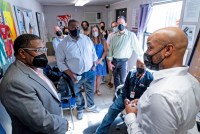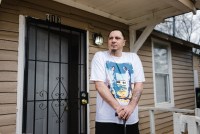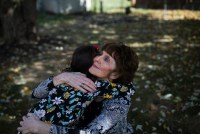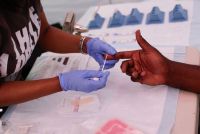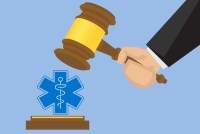Latest KFF Health News Stories
The Gun Violence Epidemic Is ‘Locking Us Back in Our Room’
As the leading cause of death for teens, firearm injuries are detrimental to more than just physical health. It takes a major toll on young people’s mental health.
Mood-Altering Mushroom Sales Bloom Despite Safety Concerns
The well-known “Amanita muscaria” mushroom is legal to possess and consume in 49 states. The market for gummies, powders, and capsules containing extracts of the fungus is raising eyebrows, though, amid concerns from the FDA and in the absence of human clinical trials.
‘A System in Crisis’: Dysfunctional Federal Disability Programs Force the Poor to Pass Up Money
With little or no income, disability applicants are seeking Social Security early retirement benefits even though it could cost them tens of thousands of dollars in future income, lawyers say.
As US Life Expectancy Falls, Experts Cite the Health Impacts of Incarceration
In a nation with one of the highest incarceration rates in the world, imprisonment speeds the aging process, research shows. Some experts complain the federal government isn’t collecting or releasing data that could identify disease patterns and prevent deaths.
US Officials Want to End the HIV Epidemic by 2030. Many Stakeholders Think They Won’t.
The federal government’s ambitious plan to end the HIV epidemic, launched in 2019, has generated new ways to reach at-risk populations in targeted communities across the South. But health officials, advocates, and people living with HIV worry significant headwinds will keep the program from reaching its goals.
Reentry Programs to Help Former Prisoners Obtain Health Care Are Often Underused
More than 600,000 people are released from prisons every year, many with costly health conditions but no medications, medical records, a health care provider, or insurance.
Cleanup Workers Got Sick After Deepwater Horizon Oil Spill. They Want BP to Pay.
After the BP Deepwater Horizon oil spill in 2020, Rodney Boblitt’s job was to patrol a 14-mile stretch of coastline in the Florida Panhandle looking for signs of oil washing ashore. Today, the 54-year-old is among thousands of other cleanup workers who are experiencing health issues and suing BP. But proving their health conditions were caused by the oil has been challenging.
Bleeding and in Pain, a Pregnant Woman in Louisiana Couldn’t Get Answers
How one Louisiana woman experiencing a miscarriage sought care amid a climate of fear and confusion among doctors fueled by that state’s restrictive abortion law.
Hundreds of Hospitals Sue Patients or Threaten Their Credit, a KHN Investigation Finds. Does Yours?
An examination of billing policies and practices at more than 500 hospitals across the country shows widespread reliance on aggressive collection tactics.
Para lanzar un nuevo fármaco al mercado, la Administración de Alimentos y Medicamentos (FDA) exige a las farmacéuticas estudios exhaustivos para demostrar su seguridad y eficacia. Conseguir que un medicamento salga al mercado unos meses antes, y con menos gastos de lo habitual, puede traducirse en beneficios millonarios para el fabricante.
The Business of Clinical Trials Is Booming. Private Equity Has Taken Notice.
Private equity-backed Headlands Research heralded its covid-19 vaccine trials as a chance to boost participation among diverse populations, then it shuttered multiple sites that conducted them.
‘An Arm and a Leg’: When Insurance Won’t Pay, Abortion Assistance Funds Step In
Privacy concerns and coverage limits have long made insurance an unreliable option for abortion access. For decades, abortion funds have been stepping in to help people pay for what they see as essential health care.
Schools, Sheriffs, and Syringes: State Plans Vary for Spending $26B in Opioid Settlement Funds
The cash represents an unprecedented opportunity to derail the opioid epidemic, but with countless groups advocating for their share of the pie, the impact could depend heavily on geography and politics.
Centene Showers Politicians With Millions as It Courts Contracts and Settles Overbilling Allegations
Centene, the largest Medicaid managed-care company in the U.S., has thrown more than $26.9 million at political campaigns across the country since 2015, especially focused on states where it is wooing Medicaid contracts and settling accusations that it overbilled taxpayers. Among its tactics: Centene is skirting contribution limits by giving to candidates through its many subsidiaries.
For the Houma People, Displacement Looms With Every Storm
The Houma, an Indigenous tribe, has seen much of its Gulf Coast community washed away by rising sea levels and dangerous storms. Its leaders say the tribe’s lack of federal recognition makes it harder to keep rebuilding.
New Abortion Laws Jeopardize Cancer Treatment for Pregnant Patients
As abortion restrictions take effect across the South in the wake of the Supreme Court’s decision to overturn Roe v. Wade, cancer doctors are trying to decipher the laws. They’re grappling with how to discuss options with pregnant patients, who may be forced to choose whether to proceed or forgo lifesaving cancer treatments that can prove toxic for the fetus.
‘American Diagnosis’: As Climate Crises Batter the Bayou, Houma People Are Being Displaced
Rising sea levels and severe hurricanes are displacing Indigenous people in Southern Louisiana and harming health. Episode 11 explores the United Houma Nation’s push for federal tribal recognition and the climate-change help that could come with it.
Critics Worry Government Surveillance of HIV May Hurt More Than It Helps
Some people living with HIV and some state health officials are raising concerns about part of the federal effort to end the HIV epidemic: a new technology that analyzes blood samples to find emerging outbreaks. The critics say it’s too invasive and stigmatizing and might not be more effective than older public health approaches.
Conservative Blocs Unleash Litigation to Curb Public Health Powers
Spurred on by opposition to pandemic-related health mandates, a coalition of religious liberty groups, conservative think tanks, and Republican state attorneys general has filed a cascade of litigation seeking to rein in the powers of public health authorities.
This Rural, Red Southern County Was a Vaccine Success Story. Not Anymore.
Meigs County in Tennessee reported one of the highest covid-19 vaccination rates in the South for much of the past year. But those reports were wrong because of a data error that has surfaced in other states, such as West Virginia and Montana, as well.







